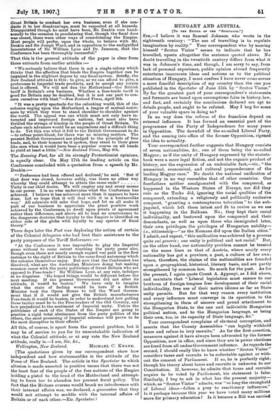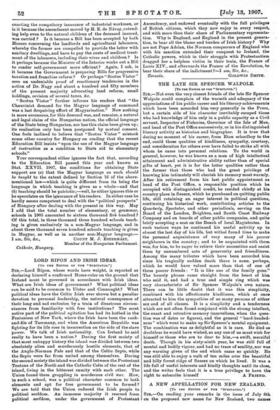HUNGARY AND AUSTRIA.
[To vas EDITOR or TEN "srscraros.".1 Sin,—I believe it was Samuel Johnson who wrote in the eighteenth century " The use of travelling is to regulate imagination by reality." Your correspondent who by naming himself " Scotus Viator " seems to indicate that he has travelled, upsets altogether the sentence quoted above. No doubt travelling in the twentieth century differs from what it was in Johnson's time, and though, I am sorry to say, from lack of personal experience, public opinion abroad frequently entertains inaccurate ideas and notions as to the political situation of Hungary, I must confess I have never come across a more fanciful description of my country than the one you published in the Spectator of June 15th by " Scotus Viator." By far the greatest part of your correspondent's statements and forecasts are based upon assumptions false in history, law, and fact, and certainly the conclusions deduced are apt to delude people, and ought to be refuted. May I beg for some of your valuable space in doing so?
In no way does the reform of the franchise depend on
external influence. It has formed an essential part of the programme of the Party of Independence for many years in Opposition. The downfall of the so-called Liberal Party, and the coming into office of the former Opposition, ripened the idea to actuality.
Your correspondent further suggests that Hungary consists
of seven nationalities, &c., one of them being the so-called Magyar; as if the unity of Hungary expressed by the statute- book were a mere legal fiction, and not the organic product of history, nor the expression of an undeniable fact,—viz., " the numerical, economical, and cultural preponderance of the leading Magyar race." No doubt the national unification of Hungary in no way resembles that of other countries. Our forefathers neither amalgamated with the conquered, as happened in the Western States of Europe, nor did they rule as the Turks did, ignoring the racial qualities of the conquered, extending a religiously and politically exclusive conquest, "granting a contemptuous toleration" to the sub- jugated, which left them intact and fit to revive as we see it happening in the Balkans. No; they kept their racial individuality, and bestowed upon the conquered and their descendants, as well as upon those who immigrated later, their own privileges, the privileges of Hungarian nobility- i.e., citizenship—" as the Romans did upon the Italian cities." I admit, and repeat, " this unification was achieved by a process quite sui generic; our unity is political and not racial." But, on the other hand, our nationality problem cannot be treated on the same lines as that of Austria, where nearly every nationality has got a province, a past, a culture of her own; where, therefore, the claims of the nationalities are founded upon a geographical, historical, literary basis, and are partly strengthened by common law. So much for the past. As for the present, I again quote Count A. Apponyi, as I did above, and maintain that " Liberal legislation must ensure to our brethren of foreign tongues free development of their racial individuality, free use of their native idioms as far as State unity permits. But for that very reason every institution and every influence must converge in its operation to the strengthening in them of sincere and proud attachment to the Hungarian State, to the one and indivisible Hungarian political nation, and to the Hungarian language, as being their own, too, in its capacity of State language, &c."
Your correspondent complains of electoral corruption, and
asserts that the County Assemblies " can legally withhold taxes and refuse to levy recruits." As for the first assertion, measures against it have always been advocated by the former Opposition, now in office, and since they are in power elections are freed from all undue Government influence. As regards the second, I should really like to know whether " Scotus Victor" considers taxes and recruits to be collectable against or with- out the consent of Parliament. If so, he is perfectly right; though his theory about taxes and recruits is unknown to our Constitution. If, however, he admits that taxes and recruits require to be voted by Parliament, his statement is false. Similarly, I beg to ask in what has the present majority— which, as " Scotus Viator " admits, was " so long the stronghold of Liberal ideas—fallen a prey to reactionary influences." Is it perhaps because this year we have voted many millions more for primary education? Is it because a Bill was carried
enacting the compulsory insurance of industrial workmen, or is it because the amendment moved by H. E. de Ndvay, extend- ing help even to the natural children of the deceased insured, was carried ? Is it because a Bill has been accepted by both Houses concerning the landlords and agricultural labourers, whereby the former are compelled to provide the latter with sanitary dwellings, and have to pay the costs of medical treat- ment of the labourers, including their wives and children ? Is it perhaps because the Minister of the Interior works out a Bill to render self-government more efficient ? Again, I ask, is it because the Government is preparing Bills for progressive taxation and franchise reform ? Or perhaps " Scotus Viator" sees an undeniable proof of reactionary tendencies in the action of Dr. Nagy and about a hundred and fifty members of the present majority advocating land reform, small holdings, revision of several taxes, &c.
" Scotus Viator" further informs his readers that "the Chauvinist demand for the Magyar language of command was a last despairing effort of Magyarisation." Now nothing is more erroneous, for this demand was, and remains, a natural and legal claim of the Hungarian nation, the official language of the State being Hungarian, nor has this claim been given up ; its realisation only has been postponed by mutual consent. One feels inclined to believe that "Scotus Viator" mistook some other country for Hungary on reading that the recent Education Bill insists "upon the use of the Magyar language of instruction as a condition to State aid to elementary schools."
Your correspondent either ignores the fact that, according to the Education Bill passed this year and known as Stat. XXVII. 1907, the conditions for obtaining State support are (a) that the Magyar language as such should be taught to the extent defined by Section 16 of the above- mentioned law—which is quite different from its being the language in which teaching is given as a whole—and that (b) teaching should be patriotic ;—well, he either ignores this or he speculates on the ignorance of his readers. In either case he hardly seems competent to deal with the "political prospects" of Hungary after dealing with the present in this way. May I add that the total number of elementary, or grammar, schools in 1905 amounted to sixteen thousand five. hundred ? Of this total, in three thousand three hundred schools teach- ing is given exclusively in a non-Magyar language, and in about three thousand seven hundred schools teaching is given in Magyar, as well as in another non-Magyar language.—
Member of the Hungarian Parliament.
Csdkvdr, Hungary.







































 Previous page
Previous page